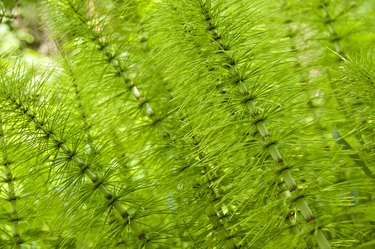
Horsetail, a relative of the fern, is a perennial herb whose relatives populated the forests over 270 million years ago. Modern-day horsetail has been used for medicinal purposes for hundreds of years, dating back to the ancient Romans and Greeks. Its scientific name, Equisetum arvense, is derived from the Latin words equus meaning "horse" and "seta" meaning bristle. Over the years, horsetail has been used for treating wounds, digestive disorders, nosebleeds and infections. Currently, it is most often used as a diuretic and for treating osteoporosis, kidney and bladder problems.
Appearance and Forms
Video of the Day
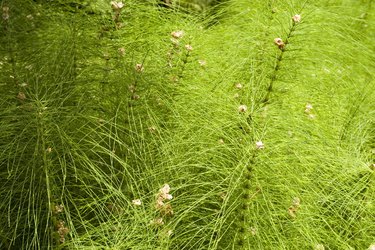
Horsetail is also known by other names, including bottle brush, paddock pipes, toadpipe and pewterwort. It has no flowers or leaves and grows in two stages, first producing an asparagus-like stalk which fills in with the bristly stems that are harvested for medicinal use. Horsetail has a reedy exterior and contains a high amount of silica, which made it an effective natural abrasive. English dairy maids used it to scour their milk pails. There are 20 species of horsetail, but only one is used for medicinally. Horsetail extract is available as a powder, tablets, capsules and tincture. The University of Maryland Medical Center recommends using one to four ml of a 1:5 tincture three times per day or 300 milligrams of standardized extract three times daily. It can also be taken in a tea or used in a compress.
Video of the Day
Benefits
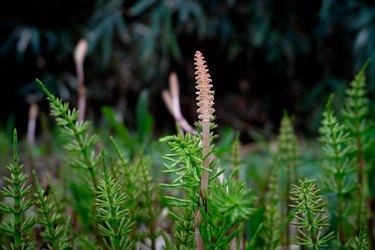
Horsetail contains potassium, aluminum and manganese, along with 15 different bioflavenoids which AltMD considers to be responsible for its strong diuretic properties. The silica in horsetail may be beneficial in treating osteoporosis, but more studies are needed. Horsetail is also used to treat water retention, urinary tract infections, kidney stones, heavy menstrual periods and brittle nails. Horsetail tea can be used in a compress for itchy skin rashes, like eczema.
Side Effects
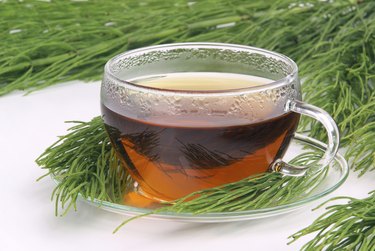
Horsetail is not recommended for long-term use. The side effects associated with short-term use of horsetail are typically mild and include stomach discomfort, diarrhea and increased urination. A few cases of nerve damage have occurred, the symptoms being confusion, visual disturbances, difficulty walking and amnesia. You can develop an allergic reaction to horsetail and the symptoms include skin rash, wheezing, difficulty swallowing and swelling of the face. Discontinue using horsetail immediately if any signs of an allergy occur.
Safety Issues
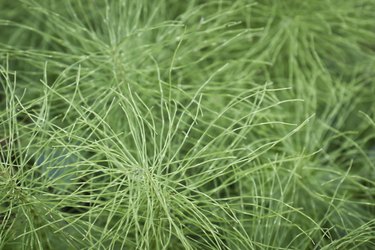
There are some serious safety issues concerning the use of horsetail and the FDA lists it as an herb of undefined safety. Be absolutely certain you are taking the correct species of horsetail, because the species Equisetum palustre is poisonous. Horsetail contains nicotine and is toxic to children so it should be taken only by adults; women who are pregnant or breastfeeding should not take horsetail. If not manufactured properly, horsetail extract may contain an enzyme that destroys thiamine and cause permanent liver damage. It should be used only under medical supervision if you take other diuretic medication.